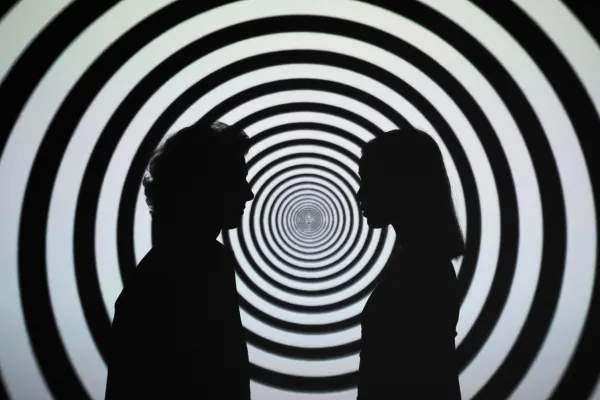
Is Hypnosis Real?
IS HYPNOSIS REAL?
I recently posted some videos on my Facebook Page of me performing hypnosis in Vegas. Someone asked, “Is hypnosis real?” Considering that the American Medical Association recognized it back in 1958, you’d think we’d have moved past that question by now—but apparently not. Once again, Hollywood has a lot to answer for. Movies always portray hypnosis as something mystical, eerie, or a tool used by villains to control people.
So, the answer is a resounding yes. It's backed by science, empirical evidence, and centuries of practice.

A Natural State of Mind
At its core, hypnosis is a natural state of focused attention and heightened responsiveness. It's similar to the state you experience when you’re absorbed in a good book, engrossed in a movie, or even daydreaming. In moments like these, your mind is intensely focused, and outside distractions seem to fade away. This is the essence of hypnosis.
During a session, your hypnotist helps guide you into this state. Once there, your mind becomes more open to positive suggestions. This allows you to access parts of your subconscious that influence your thoughts, behaviors, and emotions. This state is often used to address a variety of issues, including pain relief, weight control, quitting smoking, anxiety, and phobias.
The Science Behind Hypnosis
Hypnosis has been studied extensively in the fields of psychology, neuroscience, and medicine. Research has shown that it can lead to measurable changes in brain activity, particularly in areas related to attention, perception, and emotion.
For instance, studies have used functional MRI scans. These have demonstrated that hypnotized individuals show altered patterns of brain activity, reflecting the deep concentration and relaxation associated with the hypnotic state.
Moreover, hypnosis is recognized as a valid therapeutic tool by major medical and psychological organizations. Those include the American Medical Association and the American Psychological Association.
People often use it as a complementary treatment for conditions like chronic pain, anxiety, and irritable bowel syndrome, among others.
Dispelling The Myths
Despite the scientific backing, hypnosis is still shrouded in myths and misconceptions. One common one is that hypnosis is a form of mind control. People think the hypnotist can make someone do things against their will. I want you to really think about this for a minute. If someone could control minds with hypnosis, why wouldn't hypnotists all be controlling people to hand over all their money and rule the world?
A hypnotist cannot make you do anything you don’t want to do. Instead, they guide you into a state where you can access your inner resources and make positive changes from within.
Another myth is that only certain people can be hypnotized. While some individuals may enter the hypnotic state quicker than others, virtually everyone can experience hypnosis to some degree.
The key factors are a willingness to be hypnotized and trust in the process. Another way of looking at that, as explained by one of my many instructors, is belief and expectation.
Hypnosis As A Tool For Positive Change
In conclusion, hypnosis is genuine and is a powerful tool for those seeking positive change in their lives.
Whether you’re looking to overcome a phobia, pain relief, or improve your overall well-being, hypnosis offers a way to tap into the power of your subconscious mind.
By working with a trained and experienced hypnotist, you can harness this state of focused relaxation to achieve your goals and unlock your potential. So, if you’ve ever wondered whether hypnosis is real, the answer is yes—and it could be the key to transforming your life.